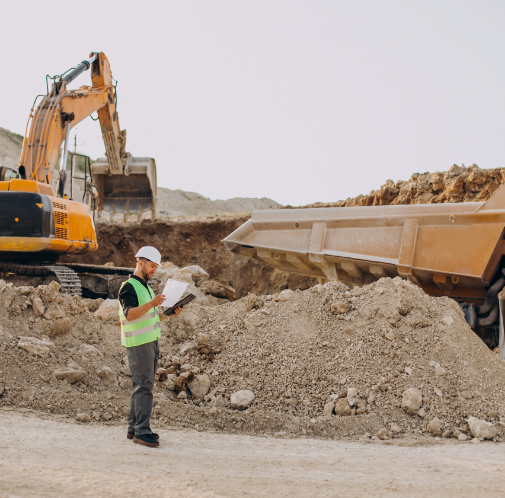Geotechnical Engineering for Safe and Reliable Structures
Request a Free Quote
Book A Call
Trusted by Companies and Homeowners Associations







Our Services Include

- SPT Borings with Truck Drill Rig
- Auger Borings with Truck Drill Rig
- Foundation settlement inspection
- Subsurface Exploration
- Preliminary Geotechnical Investigation
- Site Preparations & Foundation Specification
- Hand Auger Boring Test
- Static Cone Penetration Tests
- Foundation Design
- Pre-drilling
- Geotechnical Engineering Report
Our 4-Step Process
Initial Consultation
We will discuss your project requirements and provide an overview of our geotechnical engineering services. We will also gather any necessary information about your site, including project scope, location, and any relevant geological data.Site Visit and Laboratory Testing Plan
We’ll visit the site, collect soil samples, and conduct geotechnical testing. Our lab has advanced equipment and experienced technicians who will test the soil’s properties, including strength, density, moisture content, and permeability.Report Preparation and Delivery
We’ll create a report summarizing our findings and recommendations for site preparation and construction after lab testing. It will include soil analysis and design/construction suggestions. You can choose electronic or hard copy delivery.Follow-Up Consultation and Support
Follow-Up Consultation and Support We will schedule a follow-up consultation with you to review the findings in the report and answer any questions. We offer ongoing support throughout the construction process to ensure that your project proceeds smoothly.
-
2478+
Projects Completed
-
5,454
Inspections
-
1789+
Permits Approved
-
289+
Violations Legalized
Why Choose Souffront?
Multi-Disciplined Team of Licensed Engineers
We, at Souffront, are a team of licensed engineers who possess expertise in a variety of disciplines, including construction materials testing and geotechnical soil testing. Moreover, we aim at providing a wide range of services that can cater to all your needs.
Dedicated to Quality
We prioritize quality above all in our work. And, we provide safe, dependable, and economical engineering solutions that meet both your design and construction requirements. You can trust us to produce results, which are cost-effective and reliable too.
Experienced and Knowledgeable
Only being licensed isn’t sufficient. Geotechnical companies must have sufficient knowledge and experience working to be one step ahead of those who are just out there with some certification. Our team is one. We possess the engineering expertise to manage the most complex of jobs with integrity.
Quick Turnaround and Prompt Mobilization
Time is important in every aspect and domain of life, not just in the work industry. We respect that, which is why we offer quick turnaround times and prompt mobilization on your projects. We don’t just want to complete your project, but within the specified time and budget and efficiently.
Harness Earth’s Potential With Geothermal Engineering
Let our geothermal engineering specialists create environmentally responsible systems for your project’s success. Contact us to make a positive impact today.
Request A Quote
Geothermal Solutions For A Greener Tomorrow
Request a Free Quote
Recertification Request a Free Quote
"*" indicates required fields
Frequently Asked Questions
What is soil boring, and why is it necessary for geotechnical engineering projects?
What is soil resistivity? And, what is the importance of soil resistivity testing?
What equipment is used to conduct soil boring, and how does it work?
What information can be gathered from soil borings, and how is this information used in geotechnical engineering?
- Soil Type and Composition: Soil borings allow geotechnical engineers to determine the type of soil present at different depths, such as sands, clays, or gravels, and their relative proportions.
- Soil Strength and Stiffness: Geotechnical engineers determine the strength and stiffness of soils by performing laboratory tests on soil samples obtained from soil borings. This information is crucial for determining the bearing capacity of soils to support the weight of the proposed structure.
- Groundwater Levels: Soil borings provide information about the depth and location of the water table, which is critical for designing foundations that can withstand the effects of groundwater.
- Geologic Hazards: Engineers can also use soil borings to identify potential geologic hazards such as landslides, sinkholes, or seismic activity.
Are there any risks associated with soil boring, and how are these risks mitigated?
How much does soil boring typically cost, and what factors can affect the price?
Can soil borings be conducted in any type of soil or geologic setting, or are there limitations?
Buildings We Inspect

Residential buildings
Single-family homes, multi-family apartments, and condominiums.

Commercial buildings
Office buildings, retail stores, restaurants, and warehouses.

Industrial buildings
Factories, manufacturing plants, and processing facilities.

Institutional buildings
Hospitals, schools, universities, and government buildings.

Special-use buildings
Structures such as bridges, dams, and tunnels.
Geothermal Excellence – Redefining Energy Solutions
Receive Professional Guidance and Keep Your Property Up to Date – Get Your Inspection Today!
Request a quote

